- Home
- Anna McPartlin
The One I Love Page 2
The One I Love Read online
Page 2
After that they talked about how Jane could win Dominic back but neither came up with a workable solution so they agreed that Jane should just wait it out.
“As far as I’m concerned he’s just a cock-artist, but I know you love him so it’ll work out,” said Alexandra.
“He’s more than a cock-artist,” said Jane.
“I disagree,” Alexandra said, burping Ritz.
“He’s the one,” said Jane.
Alexandra tapped her can. “He’ll come back, Janey. He’ll see you in school every day and he’ll miss you. Just give it some time.” She stopped to throw up again, wiped her mouth and sighed. “That’s better. What was I saying?”
“Just give it some time,” said Jane.
“Exactly. And, anyway, you still have me.”
“I know.”
“You will always have me.”
“I know.”
“Even if I get science in Cork – because, let’s face it, I’m not going to get into UCD – you’ll still have me.”
“I’ll miss you,” Jane said.
“You won’t have to,” Alexandra promised. “I’ll be home every other weekend and you can come and stay with me.”
“I’ll have a baby.”
“Leave it with your mum.”
“She’s made it clear she’s not a babysitter.”
“She’s such a cow.”
“Yeah, she is.”
“I love you, Jane.”
“I love you too, Alex.”
They were interrupted by Jane’s mother, who was even drunker than Alexandra and determined to fight. “Go home, Alexandra.”
“I’m going home.”
“So go!”
“I’m going.”
“So get out!”
“Jesus, what’s wrong with you, woman? Can’t you see I’m trying to get up?”
Jane helped her friend into a standing position.
“See?” Alexandra said, with arms outstretched. “I’m off!” She wove through the corridor and walked out of the front door. She turned to say goodbye but Jane’s mother slammed the door in her face.
Jane’s mother turned to Jane. “She’s not welcome here any more.”
“She’s my best friend.”
“Yeah, well, kiss your best friend goodbye.”
That was the last time Alexandra was in Jane’s house. Jane gave birth to a son two weeks later and, although they maintained a friendship for four months after that, when Jane became a mother and Alexandra went to college in Cork they lost contact. Over the next seventeen years Jane often thought of her friend and she missed her.
Leslie, 5 June 1996
Dear Jim,
It’s time to talk about Leslie. We both know she’s stubborn and cut off and we both know why. When I’m gone you’ll be all she has left in this world and I know it’s a big ask but please look out for her.
We’ve talked about you remarrying and you know I want you to find someone to love and to love you. I want you to have a great new life that doesn’t include overcrowded hospitals, dismissive doctors, overworked nurses and cancer. I want you to find someone strong and healthy, someone you can go on an adventure with, someone you can make love to, someone who doesn’t cause you anguish and pain. Every time I see your face it hurts because for the first time I see that, in loving you, I’ve been selfish and I understand why Leslie is the way she is.
Leslie is a better person than me. I know you’re probably guffawing at that as you read but it’s true. She’s watched her entire family die of cancer, and when we were both diagnosed with the dodgy gene after Nora’s death, she made the decision not to cause pain to others the way Nora caused pain to John and Sarah and I’m causing pain to you. Before cancer she was smart and funny, kind and caring, and she still is to me. Without her care I wouldn’t have coped. I know sometimes she calls you names but, trust me, she knows you’re not a monkey, so when she calls you an arse-picker, ignore it and be kind.
I thought she was being defeatist. I thought that we’d suffered enough as a family and that we’d both survive. So I made plans and fell in love and for a while we had a great life, but then that dodgy gene kicked in. Now I see you look almost as ill as I feel and I realize that my sister Leslie knew exactly what she was doing when she broke up with Simon and all but closed off. I watched her disappear from her own life. I thought she was insane back then but it makes sense now. She put the pain of others before her own. She watched John and Sarah suffer after Nora and she’ll watch you suffering after me, and although she pretends not to like you, she does, and it will hurt her and it will also confirm for her that she is right to remain alone, waiting for a diagnosis that may never come.
I’m her last family and friend. She hasn’t even let herself get to know her niece so when I’m gone she’ll have no one and that haunts me. Please go and live your life but all I ask is that, every now and again, no matter how rude or uninviting she may seem, call to her, talk to her, be her friend even if she fails to be yours, because she has been there for me, for Mum, for Dad and Nora, and I can’t stand the idea that after everything she’s been through she should live or die alone.
I know I say it all the time, and in all my little notes and letters about this and that, but time is running out and I need you to know that it’s been a privilege to be your wife and, although I feel selfish for all the pain I’ve caused you, I know I’ve brought happiness too, so hang on to that and forgive me because, even knowing what I know now, I’d love and marry you again. I suppose Leslie would say I was a selfish truffle-sniffer but I can die with that.
Yours,
Imelda
Imelda Sheehan died at eight o’clock on the morning of 12 July 1996. She was twenty-five years old. Her husband Jim was by her side, holding her right hand, and her sister Leslie was sitting on the opposite side of the bed, holding her left hand. They both felt her slip away at exactly the same time. For Leslie it was familiar: the ocean of grief inside her swelled and rose but she knew what to do: she remained still and allowed the pain to wash over her. For Jim it was so shocking: one second his wife was alive and battling to breathe, the next dead and silent. He let Imelda’s hand go and stood up quickly, so quickly that he nearly fell. He steadied and hugged himself. He stood in the corner of the room as the doctor and nurses approached to confirm time of death.
Leslie sat with her dead sister Imelda, holding her hand for as long as they would allow her to. Jim cried and his parents, brothers and friends made a fuss of him. Leslie sat alone and frozen. She knew that the physical pain, which made her heart feel like it was about to explode and her ears ring until she feared they’d bleed, would dissipate in time, just as the tide would turn and, with it, Imelda would drift further and further away until she was a distant memory. It only served to make her loss greater. Leslie had just turned twenty-nine.
Jim asked Leslie to read at the funeral but she refused. He asked her to sit beside him and in the first pew, when she’d attempted to sit at the back of the church. She told him she didn’t want to shake hands with the people whose hands she had shaken so many times before, but Jim was not taking no for an answer: she found herself sitting beside her brother-in-law with a heavy heart and the all-too-familiar swollen hand from those whose earnest sympathy had ensured they squeezed too tight.
When the priest asked if anyone would like to speak, Leslie stood up. This surprised her and those around her, especially Jim who hadn’t even been able to get her to do a reading. She found herself standing without reason. The priest asked her to come forward but her legs refused to comply with his request. He waited and the congregation waited, and Jim nudged her and asked if she was all right. What the hell am I doing? she asked herself, as she started to move towards the altar. But once she was on the altar and standing in front of a microphone the words came easily.
“I am the last of the five Sheehans,” she said. “Four days ago there were two of us, me the middle child, and Imelda the baby of the fami
ly. I should have been next, and not just because I was older but because Imelda was the strong one, the one who embraced life regardless and without fear. Over the years she’s run five marathons in aid of cancer. I didn’t even walk for cancer, not once – mostly I’ll avoid standing if I can.” She stopped to take a breath. There was a hint of a titter from the crowd. “She fell in love and married Jim, and she always planned to have kids. Imelda always made plans and that’s what I admired about her most because even when she was diagnosed with the same cancer that had killed our grandmother, our mother and sister she still made plans. She froze her eggs and they bought a house and when she wasn’t in chemo she travelled. Even when she knew her life was coming to the end she still made plans. Little plans that don’t mean much to most, like ‘Tonight we’ll reminisce about the summer we spent in Kerry’ or ‘Tomorrow when the sun comes out we’ll sit in the hospital grounds and watch the people come and go and make up stories about who and what they are.’ She even planned her own funeral. She knew exactly what she wanted, the kind of coffin, the flowers, the priest, the prayers, the attendees. She asked me once if I would speak at her funeral and I said no. I’m sorry, Imelda, of course I’ll speak for you. I just was scared that I wouldn’t know what to say and I didn’t want to let you down. So I’ll just end by saying this: I miss my dad, my mum, my sister Nora and now I miss my Imelda and I’m so sorry because it should have been me, but I’ll see you all again and soon.”
Leslie’s voice was cracking, her eyes streaming and her nose running. She walked towards her seat and, once she’d accepted a tissue from Jim, she sat with her head in her hands, attempting to regain her composure but finding it almost impossible to do so. Her hair was jet-black, she was slim and, although not a natural beauty, she was striking. The people sitting in the pews behind her felt nothing but pity for a young woman who was merely waiting for her turn to die. Later, by the side of the grave, she watched Jim grieve and if there was something she could have said to make him feel better she would have said it, but there wasn’t so she stood in silence waiting for the day to end so that she could disappear behind her closed door and wait for the inevitable. It never occurred to her that she’d be still waiting for the inevitable twelve years later.
Tom, 25 August 2007
Transcript of Liveline radio show with Joe Duffy
“I have a Tom Kavanagh on the line. Tom, are you there?”
“I am, Joe.”
“Tom, you’re trying to find your lovely wife Alexandra.”
“Yes, Joe.”
“She went missing on the twenty-first of June this year?”
“It was Thursday, the twenty-first of June.”
“Tell us about it, Tom.”
“I don’t know where to start. She was last seen in Dalkey and now she’s gone.”
“Okay, okay, all right. How about you tell us a little about her?”
“She’s funny, she’s giddy, she’s kind, she’s friendly, she’s fussy, she’s lovely, Joe.” Caller becomes emotional.
“The police have managed to retrace her steps as far as Dalkey. Can you tell us about that?”
“She left the house in Clontarf around two p.m. She said hello to a neighbour who verified the time. She walked to the station, and three teenagers who were there came forward to say that they witnessed her getting on the train. She’s also captured on CCTV footage on the platform at Tara Street at three thirty but she got back on the train. After the stations were canvassed, a woman came forward and identified her as getting off the train in Dalkey. She was captured on CCTV footage again there but after that …” Caller becomes emotional.
“And after that?”
“She was gone. She’s just gone.”
“Ah, God, that’s desperate. What time was that?”
“It was approximately four p.m.”
“And where were you?”
“I was working. We were finishing a project in Blackrock.”
“It says here you’re a builder.”
“I am.”
“So when did you realize she was missing?”
“I was supposed to be home by four. I’d promised to make dinner because Alexandra was meeting her friend Sherri to collect tickets for a gig from her. She had left a note saying she’d be home by seven thirty. But I was delayed on site. I didn’t get in until nine p.m.”
“When did you raise the alarm, Tom?”
“The next morning, Joe.” Caller becomes emotional. “I thought she’d stayed out with Sherri or maybe that she was pissed off I didn’t get home in time to make the dinner so went out again. I was exhausted so I fell asleep.”
“That’s understandable. What age is Alexandra?”
“She’s thirty-five. She has chestnut-brown hair, shoulder length. She was wearing black trousers and a black blouse with a bow on it. She had a black fitted jacket on. She’s very attractive, the kind of person you’d remember if you’d seen her.” Caller becomes emotional.
“And she went missing on …”
“Thursday, the twenty-first of June this year.”
“And did she have any mental issues, Tom?”
“No, Joe. She was a very happy, well-adjusted, normal woman. She was normal, Joe, ordinary.”
“Okay, okay.” Joe sighs. “I’m going to ask the obvious, Tom, so forgive me. Is there any chance she took herself into the water?”
“No. No. She wasn’t suicidal and the coast guard searched it and the police divers and there were plenty of people on the beach that day and no one saw her.”
“Okay, I had to ask. I’m sorry for your trouble, Tom. I hope that maybe someone listening remembers something.”
“And, Joe?”
“Yes, Tom?”
“I’ll be at Dalkey train station handing out flyers later this evening and I’ll be doing the same at a Jack Lukeman gig on Dame Street next Friday.”
“Why there, Tom?”
“She was a big fan, Joe. She never missed a show.” Caller becomes emotional.
“And he’s very popular. Lots of people from all counties will be there.”
“It’s as good a place as any to get the word out, Joe.”
“God love you, Tom. I sympathize. Good luck to you. We’ll put Alexandra’s details on the website and if you could send in a photo we’ll post it.”
“I will, and thanks for taking the call.”
“And if anyone has information on Alexandra Kavanagh, who went missing on the twenty-first of June 2007, would they contact Clontarf Garda Station and the inspector in charge of the investigation is Des Martin. Right, we’ll be back after these ads.”
Tom put down the phone and turned to Breda, his mother-in-law. She was sitting at the kitchen table, looking frail and small. She smiled at him through tears. “You did very well, love,” she said.
“You should have left this phone number,” Eamonn said, while pacing. Eamonn was Alexandra’s older brother; he and Tom had never really been close. Alexandra’s disappearance had served to widen the divide between them. “And you should have said that she was upset about not getting pregnant.”
“Nothing to do with anything,” Tom said. “She was fine, happy.”
“You just didn’t want to see it!” Eamonn shouted. “It was tearing her apart and you didn’t see it!”
“Take that back, Eamonn,” Tom said, walking towards him.
“Take a swing, I dare you,” Eamonn said, and braced himself as if for a fight.
Breda called out to the two young men: “Stop it, both of you!”
Alexandra’s father stood up from the chair he’d been sitting in outside on the patio. He put his cigarette out and came inside. “Go home now,” he said to Eamonn and Tom. “Go home before you both say and do things you’ll regret.”
Eamonn and Tom nodded and apologized. Breda was crying again. She looked at Tom, who had aged ten years in ten weeks. His black hair was almost entirely grey; his once-sparkly blue eyes were tired and circled by shadows. He had been
so pernickety about the way he looked that Alexandra’s family, especially Eamonn, had often joked about her marrying a metro-sexual. His suits were always the best of suits, dry-cleaned after one wear and precisely tailored. His hair was perfectly cut, and his face perfectly clean. Off site Tom didn’t look like a builder, he looked like a banker. He was wealthy, and although he wasn’t extravagant, he left those around him in no doubt about his standing.
Breda noticed his suit was now too big, his hair a mess, and he hadn’t shaved in weeks. He was a shadow of the man he used to be, as she was a shadow of the woman and mother she once was. She recognized his suffering because it mirrored her own and she wanted her son, whose anger was more intense than his pain, to stop hurting her already mortally wounded son-in-law. She promised herself she would talk to Eamonn when she found the strength to deal with his quarrelsome nature.
When Tom was leaving Breda hugged him and he could feel every bone in her back. She whispered into his ear, “She’s still with us – I can feel it. God will take care of her. She’s not alone because God is there beside her.”
Tom nodded. “Try and eat, Breda.”
He left and got into his car. He sat for a minute or two and was still there when Eamonn came out of the house. Eamonn walked over to the car window and knocked on it. Tom rolled it down.
“I don’t care what the police say,” Eamonn said. “I don’t care what my mother says. It’s your fault. I blame you.” He turned and walked to his own car, got in and drove away, leaving Tom sitting in Alexandra’s parents’ driveway, crying like a baby.
Oh, God, please, please, where is she? Bring her home to me, please, please, bring her home! I’m so sorry for everything I’ve done. Forgive me and bring her home.
Alexandra was then missing nine weeks and two days.
Chapter 2
Fear Is The Key
All the shapes in the dark are playing with your heart,
fear is always near.
It’ll never set you free, it’ll never let you be,
once you let it in all the fun begins,

 alexandra, gone
alexandra, gone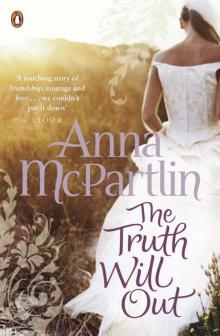 The Truth Will Out
The Truth Will Out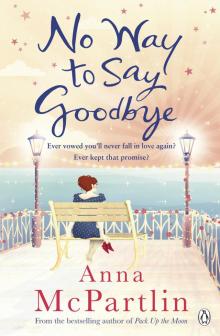 No Way to Say Goodbye
No Way to Say Goodbye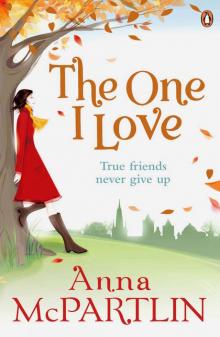 The One I Love
The One I Love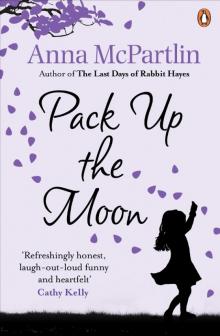 Pack Up the Moon
Pack Up the Moon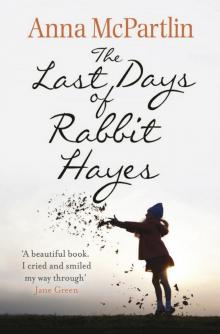 The Last Days of Rabbit Hayes
The Last Days of Rabbit Hayes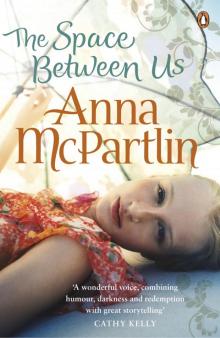 The Space Between Us
The Space Between Us